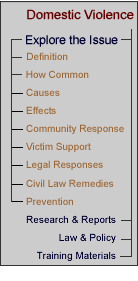|
|
|
ADVOCACY APPROACHES
Domestic violence advocacy strategies are often grounded in “equality” or “difference” approaches. Under an equality approach, the problem of violence against women is understood as having its roots in differential treatment of men and women. For example, the legal system inadequately protects women because it treats stranger violence differently than it does violence perpetrated by a spouse or intimate partner. Advocacy efforts must focus on ensuring that the legal system treats all forms of violence equally. Advocates working under a “difference” approaches, on the other hand, view violence perpetrated in the family as different from stranger violence and maintain that any solution must respond to and account for those differences. The Domestic Abuse Intervention Project in Duluth, for example, has adopted such an approach. Under this approach,
From Ellen L. Pence, “Some Thoughts on Philosophy,” in Coordinating Community Responses to Domestic Violence: Lessons from the Duluth Model 25, 31 (Melanie F. Shepard & Ellen L. Pence eds., 1999). Effective domestic violence advocacy may include both approaches. Making sure that the police respond as quickly to domestic violence incidents as they do to incidents of stranger violence is critical to ensuring adequate protection for battered women. However, many have argued for laws specifically designed to address domestic violence. Laws that criminalize domestic violence may be more effective than general laws that may render this kind of violence invisible. In addition, general laws rarely provide victims with the special assistance they need or counter the unique difficulties they face in accessing the legal system. Advocates should always be aware of the possibility that any legal reforms that separate domestic violence from general crimes may ultimately backfire and result in domestic violence being viewed as a “second class,” less important crime. Finally, there are other approaches that may be utilized by domestic violence advocates. Promoting Women in Development, for example, uses a development approach to domestic violence. As described in Justice, Change, and Human Rights: International Research and Responses to Domestic Violence, domestic violence hinders development and obstructs women’s full participation in development. |

